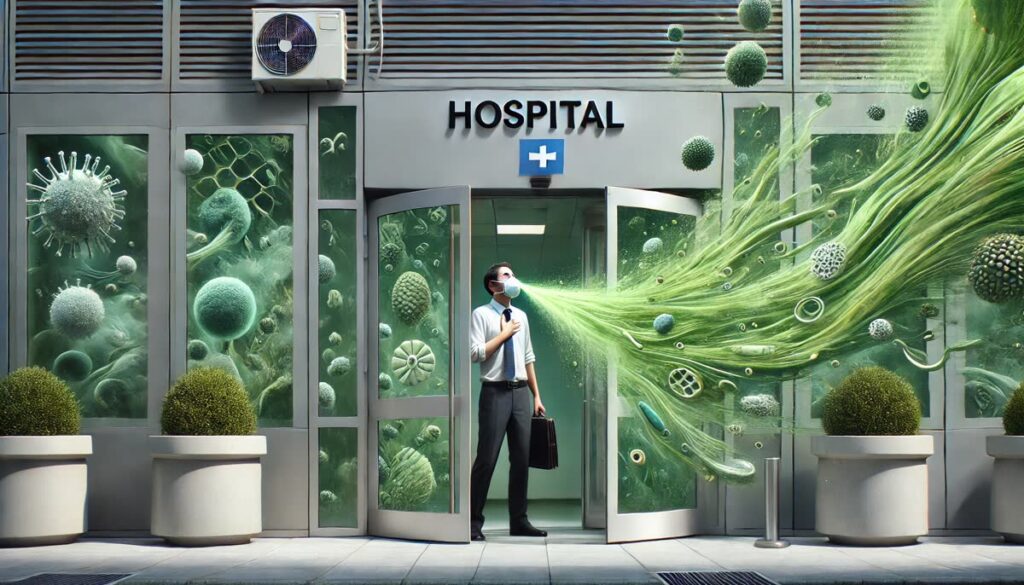What do you do when the very place that’s supposed to save your life makes you sicker? I did not realize I had a CIRS hospital allergy until I went there. In this post I explore the implications and alternatives when you are allergic to the hospital.
For people living with CIRS (Chronic Inflammatory Response Syndrome), mold illness, and chemical sensitivity, hospitals aren’t safe havens anymore. They become potential minefields. With a real chance the patient will suffer from a CIRS hospital allergy.
“CIRS is a chronic, systemic inflammatory response that occurs in susceptible individuals after exposure to water-damaged buildings and their microbial contaminants. – National Center for Biotechnology Information
A CIRS sufferer will often become allergic to old buildings, chemical disinfectants, perfume, and air conditioning systems. Now ask yourself this: how many of these describe your local hospital?
In my city, the hospitals are very old buildings. I’ve visited a few of them and immediately left. My ears would block, migraines would intensify, and my nervous system would scream: LEAVE!
I quickly discovered this was because I had a CIRS hospital allergy
Most nurses I’ve known wear some kind of deodorant or perfume. As someone extremely sensitive to the VOCs (Volatile Organic Compounds) released by fragrances and deodorants. These instinctive parts of a persons hygiene routine. Make my medical situation much worse than it already is.
Then we have the AC (Air Conditioning). The enemy of the CIRS sufferer. In an old building with central air, there’s a near-100% chance the air cooling system will make a CIRS sufferers fragile health even worse.
So here’s the question: What do you do when you’re allergic to the hospital?
Table of Contents
When the Cure Feels Worse Than the Disease
I learned the hard way in Manchester, England.
After nearly three years locked in fight-or-flight, my chest finally gave in. I slumped to the floor one morning, clutching at stabbing pains. Not a heart attack, but close enough to scare me into seeking help.
First, I tried the medical center. Why? Because the hospital was an old building, and I already knew old buildings meant mold illness triggers. The medical center looked newer, safer. But even after an hour in the waiting room, I was sick, not chest pain sick, but mold-and-chemical sick.
Eventually, I saw a doctor who sent me to the place I was avoiding: the hospital.
After about 10 minutes inside, I staggered back out. My head was pounding, my left ear was blocked, my balance was off, and I was on the verge of a full-blown panic attack. Not exactly ideal when three hours earlier I thought I was having a heart attack.
This was my reality. I wanted medical help, but the very places offering it was making me worse. So what do you do?
In my case, I sat outside the hospital on a patch of tarmac away from people. I breathed, prayed, and hoped for the best. My theory was this: if I need them, they are a few meters away over there. But, I will stay here in the fresh air.
Why You Need a Medical Crash Card
A few days earlier, I had already started worrying. I was living in a soup of mold toxins, VOCs, and scented candles. I was staying with my family, whose understanding of CIRS was basically: “Clean everything with vinegar and you’ll be fine.”
My only support at the time came from a version of ChatGPT I had trained as my CIRS doctor and environmental advisor. It had prepared a detailed medical crash card for me.
At that time, I was so wired from a lack of sleep and being locked in permanent fight-or-flight that I’d become an erratic heart attack waiting to happen. The crash card felt like a lifeline, something that could make a world of difference if needed.
The medical crash card contained my basic information such as my name and blood type. It then had detailed instructions regarding my condition. CIRS (Chronic Inflammatory Response Syndrome)
In case of an extreme emergency a medical crash card can explain everything you are unable to explain yourself.
Why Do Hospitals Make People With CIRS Feel Worse?
It isn’t anxiety. It isn’t “in your head.” There are real, physical reasons hospitals can trigger people with CIRS, mold illness, or chemical sensitivity: About 25% of people carry the genetic markers that make them more vulnerable to chronic inflammation triggered by mold exposure.
Mold infections in health care facilities can be devastating, particularly for patients with weakened immune systems. CDC (Center For Disease Control)
- Mold in old buildings: Hospitals often have water damage and aging HVAC systems. Although rare, mold outbreaks can occur in healthcare facilities causing severe illness and death.- CDC. Mold in hospitals is a fact. Mold in old buildings is almost guaranteed. A patient with acute CIRS doesn’t need to be in a room with black walls — just being near a leaking sink or an old HVAC system is enough.
- Chemical overload: Bleach, disinfectants, sterilizers. Great for germs, brutal for toxin-sensitive bodies. Even a freshly bleached toilet can wreck a CIRS sufferers afternoon.
- Off-gassing plastics and VOCs: Every new chair, adhesive, and paint layer releases fumes. A CIRS patient feels these fumes in their head and lungs instantly. Which raises the question: is a brand-new hospital ward actually safe?
- Fragrance and personal care products: Nurses, doctors, and visitors often wear perfume, deodorant, or use laundry products like fabric softeners. These all add up, turning a waiting room into hell on earth.
For someone with CIRS, this is a perfect storm. Many people carry the genetic markers (HLA-DR variants) that make their immune systems overreact to biotoxins. Once the alarm system is “on,” environments others can tolerate become hostile.
What Is The Solutions. When You Have A CIRS Hospital Allergy
The truth is, there’s no easy answer. But there are survival strategies:
- Seek CIRS-literate doctors: Some practitioners (Shoemaker-trained, mold-aware specialists) understand environmental illness and may offer telemedicine.
- Prepare a “hospital survival kit”: Masks, binders, protective gear. Anything that buys you an hour or two in toxic air if you absolutely must go.
- Use newer medical centers where possible: Newer doesn’t always mean safer, but sometimes it means fewer leaks and less mold.
- Advocate for yourself: Let staff know about your sensitivities. Some may accommodate fragrance-free or low-chemical adjustments.
- Community support: Online groups for mold illness and environmental illness can help you find safe doctors, share hacks, and remind you you’re not alone.
Closing Thoughts
Last night, I felt my heart stutter again. For a moment, I thought about calling the emergency services.
But then it hit me: I’m probably allergic to the hospital. So what’s the point?
That’s the cruel paradox of living with CIRS. The place that’s supposed to help you, can hurt you. But awareness matters, and alternatives exist. If you’re reading this and wondering why hospitals make you sick. Your not crazy, and you are not alone.
Being allergic to the hospital doesn’t mean you’re out of options. It just means you need a different approach. If you’ve had a similar experience with a CIRS hospital allergy. Share it in the comments below. The more stories we tell, the more visible this invisible illness becomes.
Writing This Post
This post was written using an AI hybrid writing method. I wrote this post by recording voice notes, then getting AI to turn this into the blog post you have just been reading. How did I do? Would you read more blog posts written in this style? Let me know in the comments below.
If you want something like this for your business, contact me here


